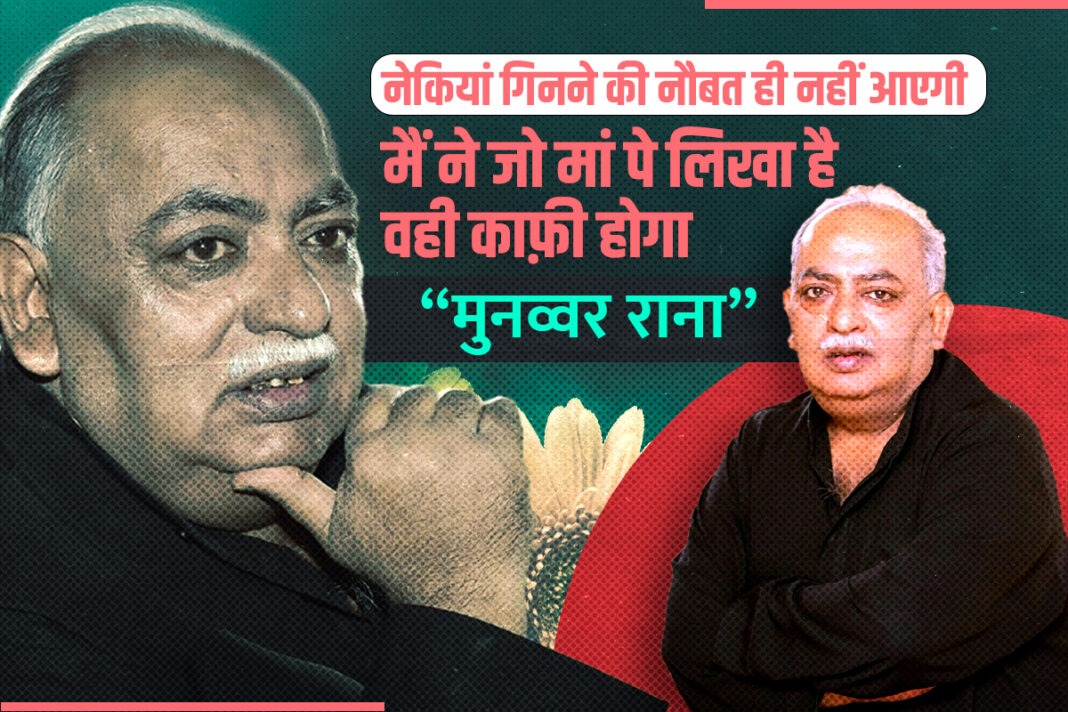Khumar Barabankvi was not merely a magician of words but a painter of emotions. His poems were visions of love, silences of love, and spiritual renditions of life itself. When love takes the form of a ghazal and flows with simplicity straight into the heart, then a name echoes in the mind. Khumar Barabankvi. He was not just a word magician but an emotion painter and a poet. His poems were the vision of love, the silence of love, and the spiritual rendition of life itself.
ek pal mein ek sadi ka maza hum se puchhiye
Khumar Barabankvi
do din ki zindagi ka maza hum se puchhiye
Khumar Barabankvi’s real name was Mohammad Haidar Khan. He was born on September 15 1919, in Barabanki, Uttar Pradesh, in a traditional zamindar family. However, this is not the case; this family was not only prominent in land property but also occupied an exclusive position in knowledge, culture, and literature.
wahi phir mujhe yaad aane lage hain
Khumar Barabankvi
jinhen bhulne mein zamane lage hain
His father, Dr. Abdul Ghafoor Khan Shauq Barabankvi, was also a renowned poet. The home first was a literary and scholarly atmosphere. This is why, from a young age, the sweetness of verses began to flow from Khumar’s lips. His literary personality was formed since childhood in the atmosphere of cultured taste, Persian and Arabic literature and the aroma of Urdu poetry.
na haara hai ishq aur na duniya thaki hai
Khumar Barabankvi
diya jal raha hai hawa chal rahi hai
The First Knock of Poetry on Lucknow’s Soil
Education Khumar attended Lucknow and Allahabad University. Lucknow’s culture and literary environment also enhanced his poetry to a greater level. It is there that he got acquainted with the art of ghazal through mushairas, poetry meetings, or masters. Khumar Barabankvi’s initial inclination was towards the poetry of poets like Ghalib, Daag, Faiz, and Josh Malihabadi. However, within no time, he developed his style – a gentle voice, simple language and laden with love.
mujh ko shikast-e-dil ka maza yaad aa gaya
Khumar Barabankvi
tum kyun udas ho gae kya yaad aa gaya
He first became a student of Lucknow poetry circles. It is here that he understood that rhyme and meter were just a small part of poetry, but the bigger thing was playing with the soul. The same fluidity and profundity that would characterise him came out in his early ghazals. The testing ground of his talent was provided by the literary salons of Lucknow, where issues of poetry and literature used to be debated. Here it was that led him to realise that real poetry is something that talks directly to the commoner’s heart.
husn jab mehrban ho to kya kijiye
Khumar Barabankvi
ishq ke maghfirat ki dua kijiye
Introduction to the World of Ghazal
His first collection was published in 1938, when he was only 19 years old, and soon, he was the soul of mushairas. His name started being added to the list of great mushairas of Hindustan. Such simple language, deep meaning, and delicate emotions were the real beauty of Khumar’s poetry. There was something special about his ghazals: they could be grasped by an ordinary worker and enjoyed by a professor teaching literature. This combination of shallowness and depth would later be one of his trademarks.
haal-e-gham un ko sunate jaiye
Khumar Barabankvi
shart ye hai muskuraate jaiye
His youthful steps in the poetic career were the immature days of experimentation. He dabbled in different forms: ghazal, nazm, rubai, but it was ghazal that really appealed to his heart. His teachers at Lucknow saw the potential in his talent, and they pushed him to express himself and learn his own voice instead of trying to mimic the masters. This advice was invaluable, and it enabled him to establish his style as something entirely personal and to be true to the classical tradition.
ye misra nahin hai wazifa mera hai
Khumar Barabankvi
KHuda hai mohabbat mohabbat KHuda hai
The Mushaira emperor
The most special thing about Khumar Barabankvi’s personality was his love for mushairas. The audience would be dressed up whenever he appeared on stage. His way of talking, the setting of his fragile feelings, the alertness, and the lower tone of his voice—all of this crazed his listeners over him. His magic was also known in the entire Hindu, Pakistan, Bangladesh, UK, Middle East, and America in the form of mushairas.
akele hain wo aur jhunjhla rahe hain
Khumar Barabankvi
meri yaad se jang farma rahe hain
He was a charismatic figure when he took the mushaira stage. The stopping he made before the delivery of a particularly beautiful couplet, the points where he made more accent on this word than on that, the feeling he had to measure the tone of the audience—these were flashes that turned him into a great performer. The other poets used to say that it was a wonderful experience when one saw poetry performed in person by Khumar.
hum unhen wo hamein bhula baiThe
Khumar Barabankvi
do gunahgar zahr kha baiThe
His mushaira performances were folklore. In one famous incident in Delhi, the audience was so moved by his ghazal about separation that there wasn’t a dry eye in the house. His ability to connect with people’s emotions through his voice and words made him not just a poet but a healer of hearts.
Attachment to the cinematic World
In the 1950s, Mumbai’s film world caught the fragrance of Khumar’s poetry. He wrote songs for some films, including Shabnam, Barsaat Ki Raat, and Laila Majnu. Renowned singers such as Rafi, Mukesh, Talat Mahmood, and Lata Mangeshkar now perform his song lyrics.
tere dar se uTh kar jidhar jaun main
Khumar Barabankvi
chalun do qadam aur Thahar jaun main
Thankfully, the love charm in his poems came in the film with the scent of fragrance. Khumar Barabankvi’s poetry was not limited to the wall of love alone. It was also an expression of loneliness, separation, loyalty, hope, and the harsh reality of life. He worked with the movie industry briefly but effectively. The writer of the lyrics realisesrealised the demands of the cinema, and the writer of poetry made sure that the literary value was also not lost. The music directors of the day would usually approach him since he used words with natural rhythm, which was easier to compose. Nevertheless, he never gave in to the commercial needs to weaken his poetry.
tu chahiye na teri wafa chahiye mujhe
Khumar Barabankvi
kuchh bhi na tere gham ke siwa chahiye mujhe
The Crown and The Literary Position
Khumar was honoured with several awards for his contribution to the literary world, including the Uttar Pradesh Urdu Academy Award, the Ghalib Award, and the Sahitya Seva Samman. He also belongs to the small number of poets of the twentieth century who introduced Urdu ghazal to the masses.
aankhon ke charaghon mein ujale na rahenge
Khumar Barabankvi
aa jao ki phir dekhne wale na rahenge
Awards were not the only memorable accomplishments of his in literature. He was invited to literary festivals and seminars countrywide to share his knowledge on poetry and literature. Scholars still study critical essays about the development of Urdu poetry. He was of the opinion that poetry has to be made available to everyone with a level of artistic excellence, which has remained a guiding philosophy of his literary life. The authority which he enjoyed in literature circles could be judged by the fact that even the poets who did not subscribe to his style freely accepted his role in democratising and simplifying Urdu poetry.
ai maut unhen bhulae zamane guzar gae
Khumar Barabankvi
aa ja ki zahr khae zamane guzar gae
Life’s Last Evening
On February 19, 1999, in Lucknow, Khumar Barabankvi bid farewell to this mortal world. Yet his poetry cannot be erased, where he lives in the hands of mushairas gatherings and the hearts, and he gives consolation to people who weep over their beloved.
His demise led to the end of an era in Urdu poetry. The literary world was sad that it had lost a poet who had made a bridge between classical tradition and a contemporary sensibility.
wo hamein jis qadar aazmate rahe
Khumar Barabankvi
apni hi mushkilon ko baDhate rahe
Thousands of admirers, poets and literature lovers had attended his funeral to give him his final farewell at a funeral where they had come to give him his final farewell as a man who had given their feelings a voice.
Even on his deathbed, he still had a strong voice when reciting his poetry despite his weakening body due to old age. People who listened to him in his final mushaira remarked that his utterances were as passionate and intense as the ones that made him popular decades ago.
An Emotion Khumar: A Spiritual Journey
Khumar Barabankvi’s poetry is still alive today in the melodies of radio, in the gatherings of mushairas, in the diaries of lovers, and in the pages of literature. He was the poet who expressed love, loneliness, and ghazal. Khumar is dead, but his words continue to live and are still living, till love remains alive. He lives on in the large number of poets he influenced, the readers who find in his poetry a solace, and even the tradition of accessible but deep poetry which he created.
bujh gaya dil hayat baqi hai
Khumar Barabankvi
chhup gaya chand raat baqi hai
In the garden of Urdu literature, Khumar Barabankvi planted flowers that continue to bloom, spreading their fragrance across generations, reminding us that true poetry transcends time and speaks to the eternal human experience of love, loss, and longing.
Also Read: Shehryar: The Poet of Dreams and Dusk
You can connect with DNN24 on Facebook, Twitter, and Instagram and subscribe to our YouTube channel.



